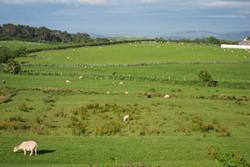New Training body to support £20BN UK Agri-food industry
 A new industry-level food training body will tackle key questions facing the future of farming and the food business.
A new industry-level food training body will tackle key questions facing the future of farming and the food business.
The AgriFood Training Partnership (AFTP) will combine the complimentary skills and knowledge of six university partners who are internationally recognised leaders in agri-food research and training. The partnership will offer more than 150 courses and workshops in all areas of agricultural production, environmental protection and food manufacture, with related scientific research and development, business and transferable skills. These include online distance learning provided by Aberystwyth and Bangor universities.
Carol Wagstaff, Director of the AFTP and Professor in Crop Quality for Health at the University of Reading said:
“We are delighted to be in the privileged position of receiving a further £1.5M from the Biotechnology and Biological Sciences Research Council (BBSRC) to enable unification of the AFTP and expansion into new markets both at home and overseas. The launch event marks the start of a tremendous opportunity for us to work together with the agrifood sector to deliver the skills the industry needs to drive increased productivity, profitability and sustainability for both pre and post farm gate agrifood businesses.
“In an era of climate change, food insecurity and an ever growing population, the AFTP is helping the industry’s best talent to deepen their knowledge, advance their skills and progress their careers through flexible training opportunities and continuing professional development.”
At a launch event held at the Geological Society in London, guests and partners in the new body heard from an esteemed panel of speakers including DEFRA Chief Scientist Professor Ian Boyd, who spoke about the future of farming following Brexit, the essential need for high quality and flexible training such as that provided by the new AFTP, and the need for farmers to develop business acumen to face the challenges of a decade of uncertainty, declining productivity, and the prospects without subsidies.
The full speech by Professor Ian Boyd is available (from 34 mins) at:
https://www.pscp.tv/AFTPnews/1gqGvbQaQMqGB?t=7
Dr David McAllister, BBSRC’s Head of Skills and Careers, spoke about BBSRC’s funding for the new body and their broader support for training and skills development through its partnerships. He said:
“A highly skilled and productive workforce is vital for the UK agri-food sector for it to remain globally competitive and contribute effectively to UK productivity and the industrial strategy. The AFTP, advised by industry practitioners, will help exchange cutting-edge knowledge and skills from the higher education research base to industry. This opportunity to improve skills whilst remaining in work is invaluable.”
Karen Lewis - Interim Executive Director, Innovation and Skills, BBSRC added:
“The agri-food sector is one of the UK’s largest industrial sectors, employing 3.9 million people, and delivering an estimated £20.1Bn in exports*. BBSRC is pleased to be funding the development of this high level skills programme that will enable the agri-food industry to benefit from the cutting edge knowledge and skills needed to improve productivity and grow the bio-economy.”
The new AFTP will act as a single entry point for all professional training in the agri-food industry, bringing together the Universities of Reading, Aberystwyth, Bangor, Cranfield, Harper Adams and Nottingham, and is funded over the next five years by the Biotechnology and Biological Sciences Research Council (BBSRC).
Courses provide professionals with the evidence-based skills to succeed in the agri-food industry, covering everything from international food law through environment and production to influencing consumer behaviour. The AFTP brings together years of industry experience with the latest research understanding to provide participants with the skills to challenge the status quo, implement change and create an agri-food sector resourced to produce sufficient sustainable food for health.
Publication date: 24 July 2017
